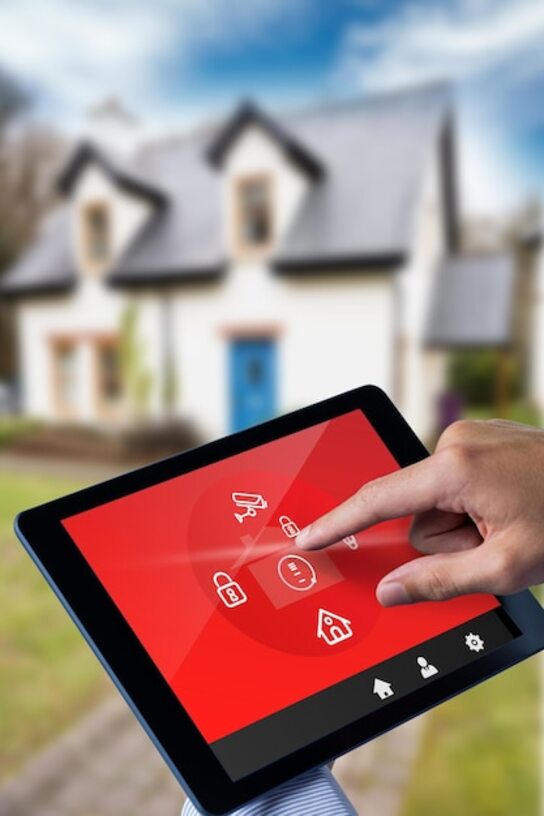Security technology that learns and adapts to your home

The security of your home has never been so smart. The security technology that learns and adapts to your needs is the key to effectively and effortlessly protecting your living space. From systems that recognize patterns to devices that adjust to your lifestyle, these innovations not only provide peace of mind but also optimize resource use. Discover how to transform your home into a safe haven, thanks to technological solutions designed to anticipate your requirements.
What is adaptive security technology?
Adaptive security technology refers to systems and devices that use advanced algorithms and machine learning to adjust their operation based on the specific needs of each home. Unlike traditional security systems, which operate under a fixed set of parameters, adaptive technology is capable of analyzing behavior patterns, identifying daily routines, and anticipating potentially risky situations. This not only enhances home protection but also minimizes false alarms and optimizes the use of resources, such as energy and time. Furthermore, this technology can be integrated with other smart home devices, creating an interconnected ecosystem that offers a smoother and more personalized experience. For example, security cameras that recognize family members or sensors that automatically adjust lighting upon detecting movement are just a few practical applications. By continuously learning from the environment, these systems become more efficient over time, ensuring a higher level of security tailored to the specific circumstances of your daily life.
2. Benefits of smart home security systems.
Smart security systems offer a range of benefits that go beyond simple surveillance. By integrating advanced technology such as artificial intelligence and data analytics, these systems are capable of learning and adapting to the daily behavior patterns of residents. This means they can distinguish between normal situations and potentially dangerous ones, minimizing false alerts and ensuring that the response is appropriate in each case. Furthermore, this adaptive capability allows the system to optimize its operation based on actual usage, helping to reduce energy consumption and extend the lifespan of the devices.
Another highlighted benefit is the ease of access and control that these systems provide through mobile applications. Users can monitor their home in real-time from anywhere, which offers an additional sense of security. Instant notifications about unusual events allow for quick decisions to protect the home before a serious incident occurs. Additionally, many solutions include integration with other smart home devices, creating an interconnected ecosystem that enhances both security and daily comfort. In summary, these systems not only protect your physical space but also enrich your everyday experience by giving you total control over your environment.
3. How devices that learn from user behavior work.
Security devices that learn from user behavior use advanced algorithms and artificial intelligence techniques to analyze patterns in daily activity. For example, security cameras and motion sensors that can differentiate between normal movement, such as that of a pet or a family member, and unusual activities that could indicate an intrusion. By collecting data on when and how different areas of the home are used, these devices are able to create a unique profile that allows them to adjust their alerts and functions to the specific needs of the user. This not only reduces false alarms but also improves effectiveness in detecting real threats. Additionally, many of these systems are integrated with mobile applications that allow the user to further customize their experience. Through these platforms, it is possible to receive real-time notifications about significant events or even activate specific settings based on time or location. For example, if the system detects that all family members have left in the morning, it can automatically activate stricter security modes until they return home. This constant interaction between the device and the user creates a continuous cycle of learning and adaptation, resulting in a dynamic and highly effective solution for maintaining home security.
The implementation of technology capable of learning from human behavior not only optimizes resources but also offers a renewed sense of control and interaction with the home environment. With each adjustment made by the system based on the user's personal preferences, a safer and more personalized home is built. In this way, each device becomes not only a passive surveillance tool but also a proactive assistant that constantly works to enhance protection and adapt to changes in daily routines.
4. Comparison between traditional systems and advanced security technology.
Traditional security systems have long been the preferred option for protecting homes. These include static alarms, manual surveillance cameras, and physical locks that require constant human intervention. While these methods can be effective, they often lack flexibility and adaptability. For example, a traditional alarm system may generate false alarms if it is not aligned with the household's daily activities, which can result in an inefficient response to actual risk situations. The reliance on manual intervention can also lead to delays in emergency response. In contrast, advanced security technology utilizes artificial intelligence and algorithms that allow it to learn and adapt to household routines. Modern systems are capable of distinguishing between unusual and usual movements, sending alerts only when it is truly necessary. Additionally, many smart devices can integrate with other elements of the home to provide a more comprehensive solution: from lights that automatically activate upon detecting movement to cameras that send real-time notifications to the owner or emergency services. This evolution not only enhances effectiveness in crime prevention but also provides a higher level of comfort and peace of mind to the user.
The comparison between these two approaches highlights not only the technological progress in the field of smart homes but also a fundamental shift in how we perceive residential security. While traditional systems require constant attention and regular physical maintenance, advanced solutions offer a proactive and autonomous approach. In this way, homes can enjoy not only greater protection against intruders but also optimize their daily operation through the efficient use of technological resources that learn and evolve alongside their inhabitants.
5. Integration of home automation in home security.
The integration of home automation in home security represents a significant advancement in the way we protect our spaces. Smart security systems, such as connected cameras and sensors, not only allow for real-time monitoring of the home but also learn from the habits and patterns of the residents. This means they can differentiate between normal situations and potential threats, sending accurate alerts and avoiding false alarms. Additionally, by being interconnected with other devices in the home, such as lights and thermostats, they can create automated scenarios that enhance overall protection.
Another key aspect of this integration is the customization capability that these systems offer. Users can adjust the settings according to their preferences and lifestyle, from scheduling specific times to activate or deactivate alarms to establishing safe zones within the home. This flexibility not only ensures greater security but also allows for a more efficient use of energy resources. At the end of the day, home automation transforms traditional security measures into dynamic and intuitive solutions that adapt to each home and its occupants, thus providing a unique and effective experience in protecting the family environment.
6. Best brands and products available in the Costa Rican market.
In the Costa Rican market, several brands stand out for offering advanced security technology that adapts to users' needs. Among them, Ring has gained popularity thanks to its security cameras and smart doorbells that allow monitoring the home entrance from anywhere. These devices are not only easy to install but also offer features such as motion detection and real-time recording, providing an additional layer of security. Another notable brand is Arlo, known for its line of wireless cameras with superior video quality and night vision capabilities, ideal for those looking to keep a watchful eye on their property.
In addition to these recognized brands, local products are also gaining ground in the smart security field. For example, SmartHome Costa Rica offers customized solutions that integrate sensors, alarms, and cameras into a single system controlled from a mobile app. This allows users to tailor their setup according to their daily habits and specific needs. The option to choose between different packages and levels of protection is key for those looking to maximize security without complications or excessive costs. With so many options available, it's easier than ever to find the right device for each home.
7. Tips for choosing the right system based on the characteristics of your home.
When it comes to choosing a smart security system for your home, it is essential to consider the specific features of your space. Think about the size of your residence: if you live in a small apartment, a compact and easy-to-install system may be sufficient, while a large house might require multiple sensors and cameras to cover all areas. Additionally, assess the layout of the rooms and critical access points; this will help you determine where to install devices such as cameras and alarms to maximize their effectiveness. Also, consider the possibility of integrating security systems with other smart home technologies you may already have, such as virtual assistants or automated lighting systems.
Another key aspect is the lifestyle you lead. If you spend a lot of time away from home or travel frequently, opting for a system that offers remote monitoring and real-time notifications will be essential for maintaining security while you're not present. On the other hand, if you work from home, you may prefer a system that prioritizes privacy and local control, minimizing unnecessary alerts during your working hours. Finally, research the customization options offered by different systems; some allow you to adjust settings according to your daily routines or even learn specific patterns to provide you with a more tailored experience to your unique needs.
8. Case studies: Successes in the implementation of adaptive technology.
One of the most notable cases in the implementation of adaptive technology is found in the use of surveillance systems that incorporate artificial intelligence. These devices are capable of learning and recognizing the usual behavior of residents and visitors, allowing them to identify suspicious activities more accurately. In a home where this type of technology has been installed, a family was able to avoid a burglary attempt thanks to the automatic alerts generated by the smart camera that detected unusual movements late at night. This system not only provided peace of mind but also optimized the response to emergency situations by instantly notifying local authorities.
Another successful example involves the integration of smart thermostats that automatically adjust according to daily routines and family preferences. A young couple significantly reduced their energy consumption by implementing this technology in their home; the thermostat learned when they were present and when they were absent, setting optimal temperatures without the need for manual intervention. Furthermore, these devices can be controlled from anywhere via mobile, allowing for scheduling changes before arriving home and thus ensuring a comfortable environment without wasting energy. This approach not only enhances security by keeping the home under constant surveillance but also boosts energy efficiency and contributes to a more sustainable lifestyle.
9. The future of home security: Emerging trends and their impact on Costa Rica.
As home security technology continues to evolve, Costa Rica finds itself in a unique position to adopt emerging trends that will redefine home protection. The integration of artificial intelligence and the Internet of Things (IoT) is enabling security systems to learn and adapt to the everyday behaviors of residents. From surveillance cameras that can distinguish between a friendly visit and a potential intruder, to alarms that automatically adjust based on the time of day, these innovations not only offer greater effectiveness but also a more intuitive experience for the user. This is especially relevant in a country where many families seek accessible yet effective solutions to safeguard their well-being.
Additionally, the social and economic impact of these technologies cannot be underestimated. The implementation of advanced security systems has the potential to significantly reduce crime rates by deterring potential offenders while promoting a safer community environment. In Costa Rica, where concern for safety is common, these emerging trends foster a culture of proactive prevention. As more households adopt this smart technology, new opportunities for local businesses in areas such as installation and maintenance are expected to arise, which will contribute to economic growth and strengthen the social fabric in Costa Rican communities.



